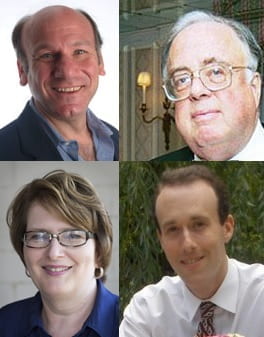
CCLP’s ongoing collaborative series “Historians, Journalists, and the Challenges of Getting It Right” continued this week with panels presented at the annual meeting of the American Historical Association. The conversations, organized in partnership with USC Annenberg’s Norman Lear Center, opened with a session on the topic “The Art & Craft of the Obituary.”
The discussion, which was covered by C-SPAN, explored collisions and collaborations between the journalists who write obituaries and the historians who study them. (Watch C-SPAN’s video of the event.)
Moderated by Lear Center director Martin Kaplan, panelists included former New York Times political correspondent Adam Clymer, Washington Post obituary editor Adam Bernstein, and Janice Hume, journalism department head at the University of Georgia, and author of Obituaries in American Culture.
The panelists discussed how historians discover cultural trends by reading between the lines of obituaries written by journalists in different time periods, while journalists often study publications by historians to lend a broader context to the obituaries they write.
“Martin Kaplan noted that obituaries have been called the source of some of the most creative writing to be found in journalism.”
“Hume noted that 19th-century obituaries often avoided discussing causes of death, instead preferring euphemisms like ‘removed by the omnipotent author.’ The Washington Post was one of the first papers to mention complications from AIDS as a cause of death, noted Bernstein, and Clymer remarked that cancer had once been unmentionable.” — Read more on the American Historical Association’s blog.
The 2014 AHA conference presented two other discussions in the “Getting it Right” series. The second panel, “Nixon and China”, was organized by Holly Cowan Shulman, a documentary editor (and sister of CCLP director Geoffrey Cowan) who said she wanted to “showcase how different sectors of the historical profession add to our understanding of the past.” The panel brought together journalists, historians, documentary editors, and archivists to discuss Richard M. Nixon’s opening of China.
This year’s third “Getting it Right” event explored “The Role of Genealogists, Journalists, and DNA Experts in Chronicling History”, featuring Rachel Swarns of the New York Times, Constance Potter of the National Archives, and Daniel Sharfstein of Vanderbilt University.
CCLP created this ongoing discussion series in 2012, in partnership with the Norman Lear Center and the American Historical Association’s National History Center. Past discussions in the series presented at the American Historical Association conference include “American Biography and the Cold War”, “Interpreting the Arab Spring”, and “Publishing in the American Century.”